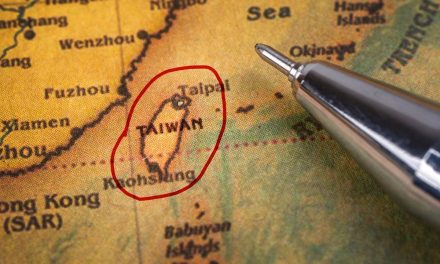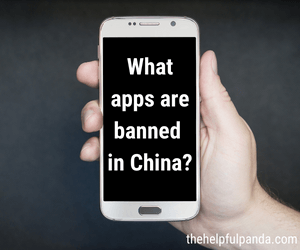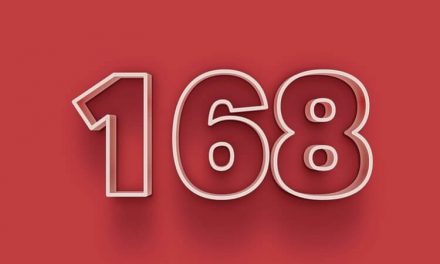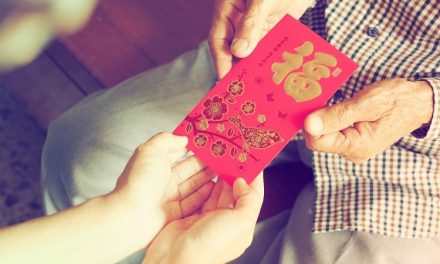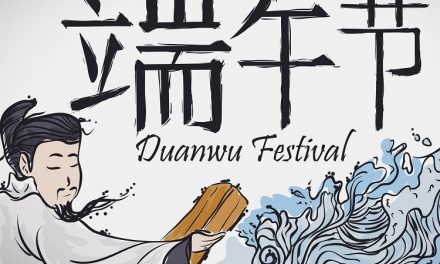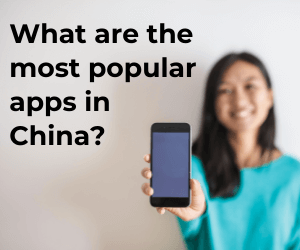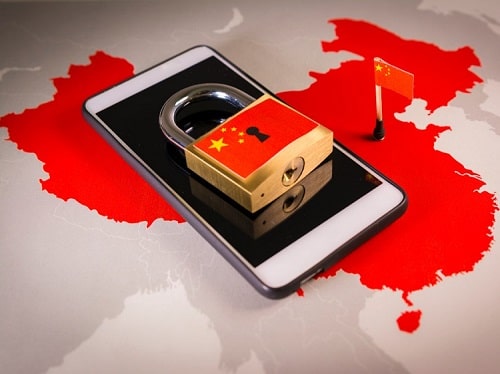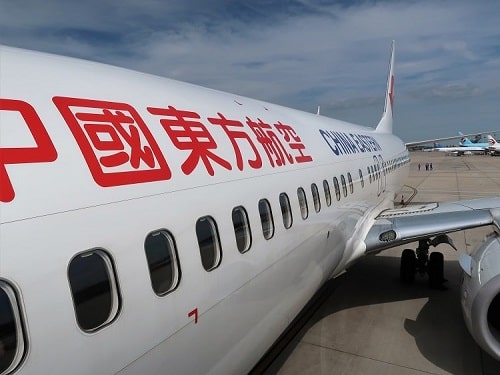Do you want to find out about Chinese culture and traditions?
Do you want to find out what Chinese people typically do, like, eat… and what makes them tick?
Well, you’ve come to the right place. This article is a collection of all the main customs and quirks you’ll experience in China.
Listed in alphabetical order, you can read them all or simply jump to the ones that pique your curiosity. I’ve also included helpful links if you want to dig a bit deeper.
Alright, let’s jump into the biggest, the baddest, and the best of Chinese culture.
A is for Apps

Chinese are obsessed in apps. Image by StreetVJ on Shutterstock.
Chinese people use phone apps for practically everything, from ordering food in restaurants to applying for jobs.
The most popular and useful Chinese app is WeChat. You can use it for a whole bunch of things like chatting to friends, paying for stuff, hailing taxis and playing games.
There are now more than one billion people who use WeChat on a daily basis. It’s very much ingrained in the Chinese way of life.
Read more about the top apps used in China.
B is for Badminton

Badminton is big in China. Image by Vladislav Vasnetsov on Pexels.
Badminton is one of China’s national sports.
It’s a highly accessible sport because all you need is a racket and shuttlecock. This has made it hugely popular in a crowded (and traditionally poor) country like China.
I’ve seen people in China – and joined in myself – play badminton without a net. They simply hit the shuttlecock to each other as a way of participating and having fun.
For elite badminton players, the Chinese government takes care of everything including housing, meals and training. This helps the country dominate the sport.
Some historians say that badminton is a derived version of the traditional Chinese game, ‘jianzi’. In this sport, players use their feet instead of a racket to hit the shuttlecock.
Read more about popular Chinese sports.
B is for Baijiu
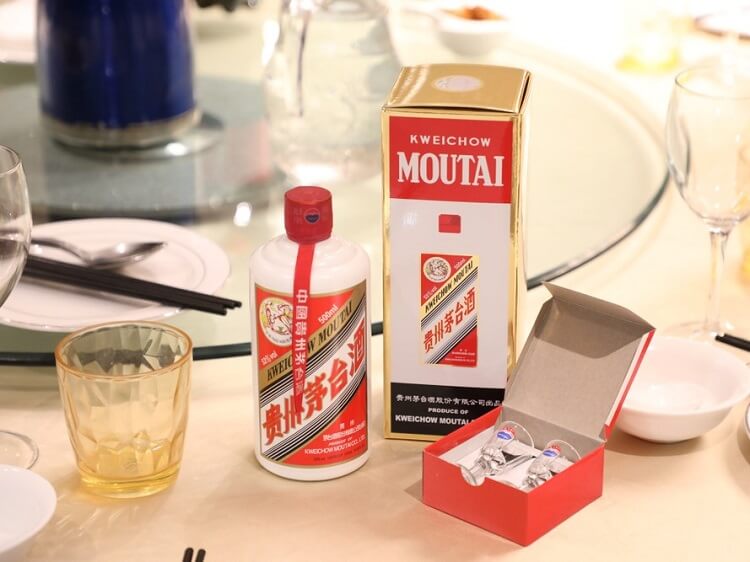
Moutai is a famous baijiu. Image by Parinya Art on Shutterstock.
Baijiu is the most consumed alcohol in China and around the world.
It’s commonly distilled from sorghum (a cereal grass) as well as other grains like rice, wheat, corn and millet.
In Mandarin, baijiu literally means ‘white alcohol’ but Westerners tend to call it Chinese rice wine.
I find this a bit misleading because it tastes nothing like the beautiful wine I’m used to! Usually drank straight, baijiu is an acquired taste.
If you’re ever in China on business, you’re going to be served baijiu. Culturally, this is the accepted drink that Chinese businessmen enjoy at the dinner table.
So, if you want your business deal to go through, don’t refuse it.
Read more about Chinese drinks.
B is for Beer

China is lax with the minimum legal drinking age. Image supplied by Mike Cairnduff.
Still on the theme of alcohol, Chinese men love drinking beer. The beverage is a quintessential part of Chinese drinking culture.
(And, as you can see in the photo above, kids don’t mind it either!)
Snow is the most popular beer in China. Every year, about 2.8 trillion gallons of the ale is sold.
In overseas markets, Tsingtao is the most famous Chinese beer (I’m a big fan). It’s a fairly light lager that originates from Qingdao in the north of the country.
Read more about the drinking age in China.
C is for Calligraphy

Traditional Chinese calligraphy set. Image by Sumalee on Shutterstock.
Calligraphy is one of the most beautiful, traditional Chinese things.
For thousands of years, Chinese calligraphy has been a way of communicating through writing, art and self-expression.
Each Chinese character, or group of characters, tells a story. Workmanship is in the strokes (the art) as well as the story. This is part of the allure of Chinese calligraphy.
If you’re ever invited into the home of a Chinese person, you’ll likely see beautiful scrolls hanging on the walls. You might also see them in fancy restaurants.
Since people use phones and computers these days, artisans who practice calligraphy are held in high esteem in China.
Read more about Chinese calligraphy.
C is for Censorship
The Chinese government isn’t democratic, meaning people can’t say what they want, when they want. If they go against the grain of government, there can be dire consequences.
Sometimes, prominent people in China (like business people and even celebrities) say something that displeases the government. They may go missing for months, then resurface with a grovelling apology. Some are stripped of millions of yuan in assets or have to pay fines.
The internet in China is censored too. Known as The Great Firewall of China, it gives over one billion Chinese people a more sheltered online experience.
Locals are prevented from saying and doing things online that don’t toe the communist party line. Major foreign websites and apps like Google, Gmail, Instagram and WhatsApp are blocked.
If you’re traveling to China on a holiday, you need to download a VPN app before you go. Refer to this page if you want to access the internet freely in China.
Read more about the internet in China.
C is for Chopsticks
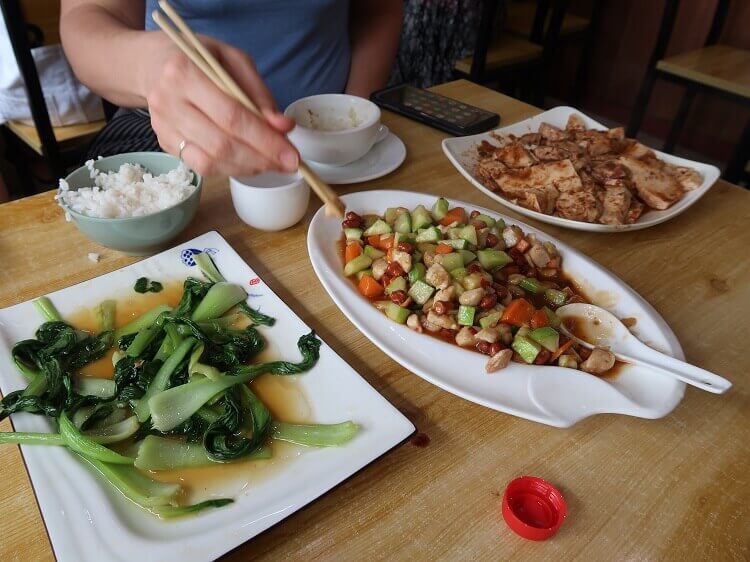
Chopsticks are the ultimate eating utensil in China. Image supplied by Mike Cairnduff.
Chopsticks have been a part of Chinese culture since 1,200 BC. Back then, they were used more for cooking and it wasn’t until around 400 AD that they were shortened and used for eating food.
The appeal of chopsticks was probably deepened because of their connection to Confucius, one of the most important figures in Chinese history (you’ll read about him next).
He stated that chopsticks were better for eating because they had blunt ends.
For many Westerners, chopsticks are fiddly, hard to control, and half the food tends to end up in your lap! But once you’ve mastered chopsticks you’ll be eating Chinese food like a pro.
Read more about how to use chopsticks.
C is for Confucius

Confucianism runs deep in China. Image by Peggy and Marco Lachmann-Anke on Pixabay.
Confucius is the father of Chinese philosophy.
During the sixth century B.C., traditional Chinese principles began to deteriorate, resulting in a period of moral decline.
Confucius recognized an opportunity – and an obligation – to reinforce the societal values of compassion and tradition.
His golden rule was based on loving others while exercising self-discipline.
He has lots of famous quotes but my personal favorite is: “Choose a job you love, and you will never have to work a day in your life.” It still rings true centuries later.
Read more about famous Chinese people.
C is for Crowds

Crowds are normal in China. Image supplied by Mike Cairnduff.
Today in China, it’s hard going anywhere where you won’t experience crowds. With 1.4 billion people squeezed into the country, it’s easy to see why.
While the locals are used to it, you might get a bit of culture shock coming to China on a holiday.
The best strategy for avoiding crowds is visiting an attraction first thing in the morning or later in the day. You should also avoid Chinese public holidays.
Read more about the best time to visit Beijing and Shanghai.
D is for Dancing
You’ll see mostly middle-aged and older women dancing to choreographed routines in public parks all over the country. If the weather is good, the dancing goes late into the night.
Dancing in public parks became a low-cost form of exercise and entertainment for many women who lost their jobs at state-owned enterprises in the 1990s.
It’s remained popular ever since because anyone can join in, and it’s a good way to socialize and make friends.
Chinese-style dancing requires a good memory. But for the locals who are used to memorizing thousands of Chinese characters throughout their school years, this isn’t too difficult.
If you travel to China, make sure you walk through one of the city parks. You’re bound to see some public dancing in action.
Read more about China’s dancing grannies.
D is for Dating

Chinese dating culture is unique. Image supplied by Kim Ooi.
Generally speaking, Chinese don’t date for fun. They date to find a partner to marry.
So, if you’re dating a Chinese girl and you get to the third date, she could already be thinking about the wedding day!
Guys are expected to pay for dates and buy gifts for their girlfriend, and sometimes for the parents too.
In fact, parents are influential when it comes to Chinese dating. If you’re not good enough in the eyes of the parents, you’re not going to get very far.
Chinese couples don’t like showing public displays of affection, like kissing or even holding hands.
Read more about Chinese dating.
D is for Dumplings
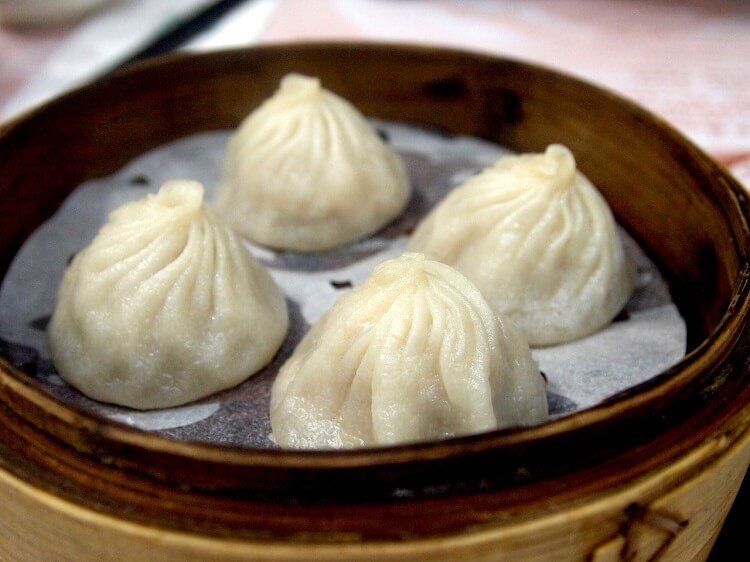
Dumplings are synonymous with China. Image by Kanghee Han on Pixabay.
This popular Chinese dish is found all over the country. These delicious little treasures are served boiled, fried or in soups.
Many areas have their own specialty dumplings. For example, Shanghai is home to the famous soup dumplings (‘xiao long bao’ in Chinese).
Soup dumplings are my favorite, though there’s an art to eating them – bite too soon and you’ll burn your lips; bite too late and the soup has gone cold.
The locals puncture a hole in the dumplings with their teeth and then slurp the soup out. This too is an art form!
Read more about different kinds of Chinese dumplings.
E is for Education

Chinese students are expected to study hard from a young age. Image supplied by Mike Cairnduff.
Education is a fundamentally important part of Chinese culture and society.
Chinese parents want their children to have a good education and study hard. In fact, many parents place a lot of pressure on students to get good grades.
Wealthy parents invest a lot of money in their children’s future, with many forced to take on private or one-on-one classes. This creates a big divide between the rich and poor in China.
The ‘gaokao’ is the final exam that all Chinese high school students undergo. For most students, it’s a stressful time because the results can determine their future.
Students who get excellent grades and wish to study at university can choose what they study and where, while less fortunate students have fewer options and may be forced to move far away from home to attend a less prestigious institute like a technical college.
Studying tertiary-level courses overseas is an increasingly popular option for smart, wealthy students.
Read more about education in China.
E is for Ethnicity

Ethnic minorities influence Chinese culture (and vice-versa). Image supplied by Christian Wilmsen.
Despite Han Chinese comprising more than 90% of China, the country is ethnically diverse. There are a further 55 recognized ethnic minority groups.
These people have greatly influenced the cultural and societal make-up of many regions in China.
While relations with the rest of China are tense among a few minority groups (e.g. Uyghurs), most ethnic minorities in China do not face persecution.
In fact, these culturally proud people have successfully preserved a unique cultural identity for generations.
Traveling across China, your journey will be colored by the wildly varying customs, cuisine and cultural traditions of various ethnic groups who have made their own mark on modern China.
Read more about interesting things about China.
F is for Face

Chinese will do anything to save face. Image by XiXinXing on Shutterstock.
The idea of face is extremely important in China, but it’s also one that many Westerners struggle to understand.
It’s a complex idea that doesn’t translate well to English, but the basic premise is that you must never deliberately or accidentally cause another person to lose their dignity, or allow yours to be lost.
This means that you should control your emotions in public, never reveal a weakness or a lie, and never criticize in public.
Westerners are usually given a little leeway in terms of face, but it’s still something you need to keep in mind when you interact with locals.
If you cause someone to lose face, it can jeopardize friendships and business relationships. That’s why it’s so important that you avoid doing anything that could cause a loss of face.
You can help Chinese people gain face by doing things like praising, complimenting, and giving gifts.
Read more about unique Chinese cultural norms.
F is for Family
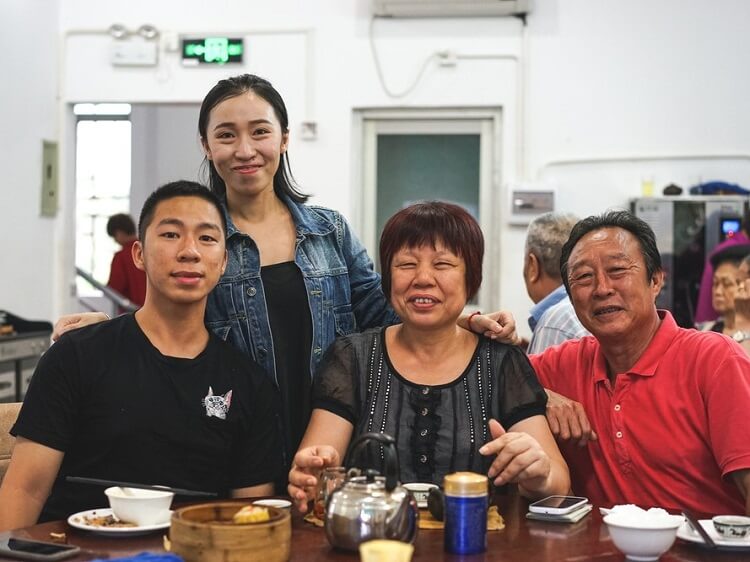
Family is number one in China. Image by Lesia Povkh on Shutterstock.
The Chinese family unit is extremely important in Chinese culture and society.
Within the traditional Chinese family structure, each family member has a specific form of address on both the maternal and paternal sides of the family.
Elderly Chinese people are looked after by their children as they age (nursing homes don’t exist in China). This is one of the reasons why Chinese feel so much pressure to have kids and keep the family line going.
This can be summed up by the Chinese concept of filial piety. It’s basically a Confucian virtue that says you should honor the elders in your family, by looking after them both inside and outside the home.
With regard to childbirth, there used to be strict limits on how many children a couple could have in China. But the government is now encouraging families to have more babies as population growth slows.
Read more about the Chinese family unit.
F is for Face masks

Even before COVID, Chinese wore face masks. Image by Pixabay.
Chinese people were wearing face masks way before coronavirus was around.
When Chinese people aren’t feeling well, they’ll wear a mask to stop the illness spreading. It also helps protect them from getting germs from other people.
On high-pollution days in China, you’ll also see people wearing face masks to protect themselves from the toxic air.
Read more about pollution in China.
F is for Festivals
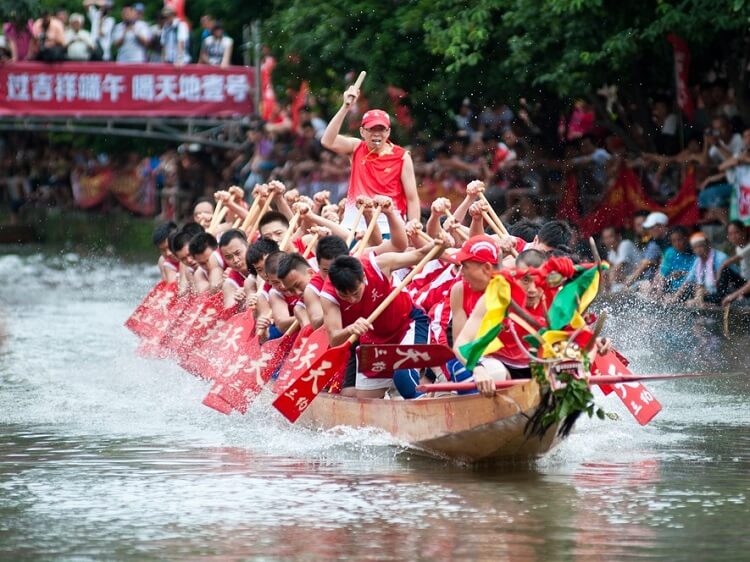
Dragon Boat Festival is very much part of Chinese culture. Image by Windmoon on Shutterstock.
There are numerous festivals celebrated throughout the year in China, and many are culturally rich.
The biggest event is Spring Festival, or Chinese New Year, which starts in late January or early February depending on the lunar calendar. People travel great distances to go back to their hometown and have big feasts with their family.
Dragon Boat Festival is an important cultural holiday in China dating back well over 2,000 years. Still to this day, the legend of Qu Yuan is remembered. Qu Yuan was a poet who drowned himself when his kingdom was defeated.
Mid-Autumn Festival is another special holiday on the Chinese calendar. Traditionally, it was a celebration of the autumn full moon and harvest season. Nowadays, it’s a time for families to get together, have a big feast, and give mooncakes to each other.
Read more about Chinese festivals.
F is for Fingernails
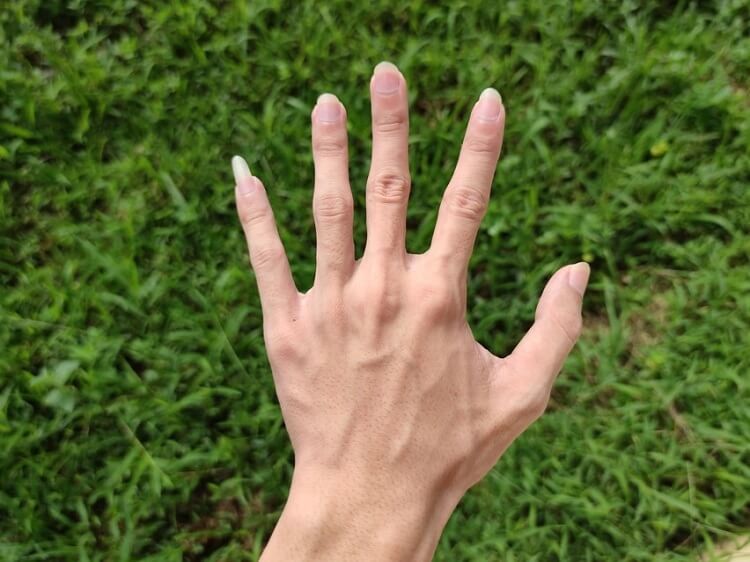
The long pinky fingernail exists in China. Image by NN_Non on Shutterstock.
You might see Chinese guys, such as taxi drivers, with one long fingernail. It’s usually the pinky finger.
You can’t do manual labor with long fingernails, so some men have them on display to show they don’t work rough jobs.
This Chinese custom is a throwback to the class system in China. Some men with long fingernails may also be wealthy.
If you visit China, you might even see men using their long fingernail to pick their ear!
Read more about class hierarchy in China.
G is for Groups
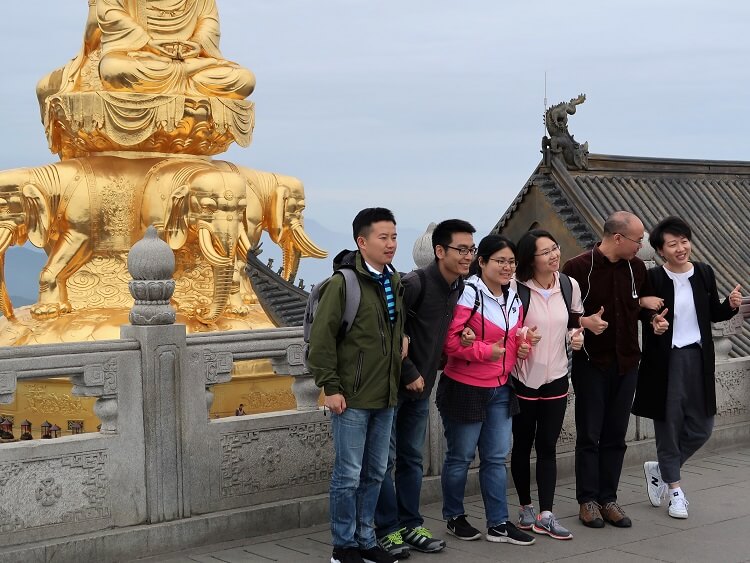
Chinese society is geared towards the group. Image supplied by Mike Cairnduff.
China is a collectivist culture.
This means the individual’s needs are less important than those of the group, whether that group is the family, the workplace, or China as a whole.
The actions of each person also reflect on the group as well. So, if one person does something wrong, their family and even their country could suffer as a result.
This can be hard to understand and even harder to accept for a Westerner, but that doesn’t mean it’s wrong. In fact, this idea has a number of benefits for the people and for the individual.
It creates incredibly strong family bonds, in which the younger care for the older in a way that’s been mostly lost in Western culture.
It also creates a strong sense of belonging, where each individual understands that they are part of a greater whole.
Read more about collectivist cultures.
G is for Guanxi

Guanxi is about the relationships you have with others. Image by Lukas on Pexels.
I think the best word to describe the Chinese term guanxi is ‘connections’.
In China, if you don’t have guanxi then you’re not going to get very far, particularly when it comes to social networks and business circles.
Good guanxi can help you get a job or a promotion, a better price on a big purchase, or even help you avoid falling foul of the law.
Guanxi is so entwined in Chinese culture it would be hard to imagine life without it.
If you go to China on vacation, you probably won’t see guanxi in action. But I can guarantee you, it’s there.
For example, that silk shop your tour guide insisted you stop at for a look – there would be strong guanxi between the shop owner and the tour company.
Guanxi is something foreigners only really get to experience if they live in China, or have close relationships with Chinese people in their own country.
Read more about the concept of guanxi.
H is for History

The Chinese are proud of their rich history. Image supplied by Mike Cairnduff.
China has a colorful history that dates back thousands of years.
There are numerous key historical events which have helped shape the Chinese culture we see today.
One example is the construction of The Great Wall of China, a 20,000 km (13,000 mile) line of defense designed to help protect China from invasion. The build started in the Qin Dynasty (221-206 B.C.) and continued over centuries.
Some say that as many as 400,000 people died during the wall’s construction, and many of these workers were buried within the wall itself.
Key historical events in more recent times include:
- Struggles with outside forces (e.g. Sino-Japanese Wars and Nanjing Massacre)
- Domestic instability (e.g. civil war between the Communists and Nationalists)
- Government programs (such as the Great Leap Forward and Cultural Revolution) that had disastrous effects on the country and resulted in millions of deaths.
I’ve only just scratched the surface here and there is so much more to explore.
Read more about modern Chinese history.
H is for Hotpot

Hotpot is super popular in West China. Image by Adam Yee on Shutterstock.
Hotpot is popular in China not just because of the great taste but because it’s eaten in a very social setting.
You place your ingredients in the simmering pot and as you wait for it to cook, you chat with your friends or family around you.
You can put practically anything in the pot, which starts with soup stock. Typical ingredients include all kinds of sliced meats, seafood, tofu and vegetables.
If you’re lucky enough to try hotpot in Sichuan province, where hotpot originates from, keep an eye on the chili. The Sichuanese like it fiery hot!
Read more about spicy Chinese food.
H is for Hot water

A common sight in China. Image by Hunter Bliss Images on Shutterstock.
The Chinese love drinking warm or hot water. They believe drinking cold water isn’t good for your health.
Even when the weather is boiling hot outside, you’ll still find Chinese people drinking warm water.
If you visit China, you’ll see people carry insulated drink bottles wherever they go. You can fill up your bottle at all sorts of places including train stations, hotels and tourist attractions.
Read more about why Chinese people drink hot water.
I is for Inventions

An ancient Chinese compass. Image by Satrio Wito on Shutterstock.
Chinese civilization goes back thousands of years, so it’s no surprise that some of the most amazing inventions originated in China.
The most famous Chinese inventions of all are paper, printing, gunpowder and the compass. These are called the Four Great Inventions.
Other ancient inventions include paper money, tea, silk, porcelain, and even the humble umbrella!
With technology in China advancing so quickly nowadays, the country claims some modern-day discoveries too. This includes things like e-cigarettes and passenger drones.
Read more about the greatest Chinese inventions.
K is for KTV

Singing at KTV is a quintessential part of Chinese culture. Image supplied by Mike Cairnduff.
KTV is the Chinese term for karaoke (it’s written as 卡拉OK).
Often combined with alcohol in the evening, KTV is a very social activity and loved by a broad cross-section of people. But it’s also a fairly private affair, with friends or colleagues using closed-off rooms in karaoke centers rather than singing in public.
You and a friend can also sing along to your favorite tunes in tiny booths in shopping malls for just a few yuan.
There’s a broad selection of both Chinese and English songs to choose from, and no shortage of big ballads and cheesy classics from days gone by.
If you’re in China and you’re invited to visit a KTV center, accept the offer as it may be considered impolite otherwise. Don’t worry if you have a terrible singing voice like me – just have a go!
Read more about KTV in China.
K is for Kung fu
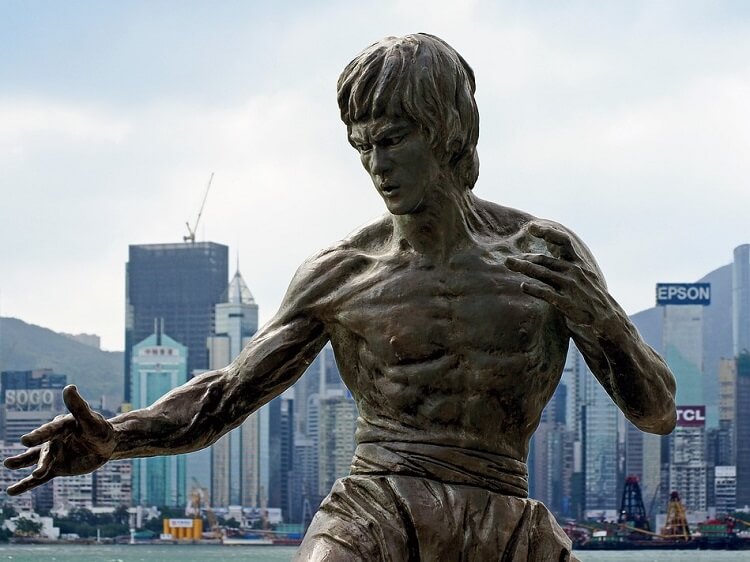
Bruce Lee is immortalized in a statue in Hong Kong. Image by tee2tee on Pixabay.
Martial arts are really popular in China, especially kung fu (or ‘gongfu’ in Chinese). It dates back to the Zhou Dynasty (1,111–255 BC) so it’s ingrained in Chinese culture and traditions.
Kung fu is a combination of spirituality, exercise, and unarmed personal combat. There are various movements in kung fu, most of which are imitations of the fighting styles of the snake and mythical dragon.
Martial arts movie icons, including Bruce Lee, Jet Li and Jackie Chan, have kept kung fu alive in mainstream Chinese culture.
Read more about kung fu.
L is for Language
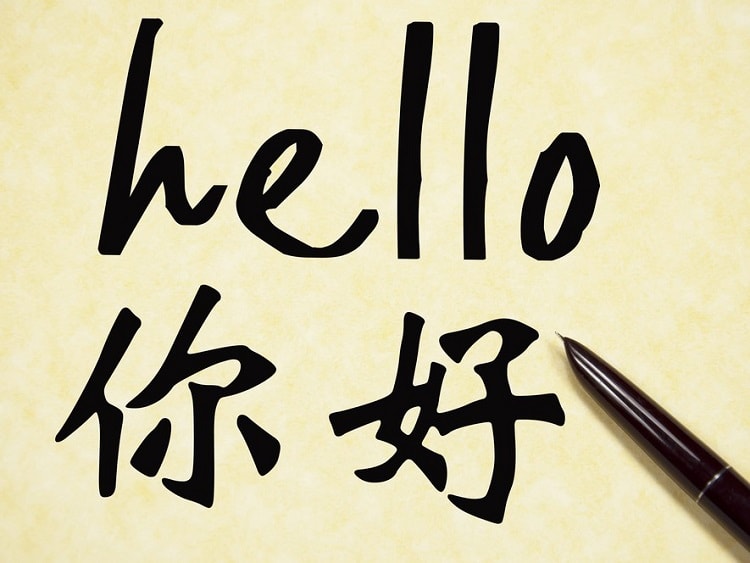
Different languages are spoken across China. Image by Woaiss on Shutterstock.
Mandarin is the national language, but it’s not the only Chinese language. There are many others including Cantonese, Hunanese and Shanghainese.
Languages can be specific to provinces, regions or even cities, making domestic travel interesting for both locals and foreign travelers.
There are four main tones in Mandarin. If you get the tone wrong, the meaning of what you’re saying can change drastically, or even make no sense at all.
This makes Mandarin difficult for foreigners to learn. However, just being able to say a few words can go a long way towards making your first trip to China easier and more enjoyable.
You can download a Mandarin phrasebook app with recorded sounds. Listen to the words and tones and then repeat, repeat, repeat.
Read more about learning basic Mandarin.
L is for Lanterns

Lanterns are embedded in Chinese culture. Image by Angela Roma on Pexels.
If you ever make it to China, you’ll see red lanterns everywhere. They’re one of the most traditional Chinese things.
In ancient China, they were used to provide light when electricity wasn’t around. They were also used as part of Buddhist worship.
Today, lanterns are used for decorative purposes, during festivals, as well as for worship. They’re also a symbol of national pride.
If you’ve got children, making paper lanterns is a fun activity that will keep the kids entertained as well as teach them about Chinese culture and traditions.
Read more about Chinese culture for kids.
L is for Lucky numbers

Eight is the luckiest Chinese number. Image by Liza Trinidad on Pixabay.
In Chinese culture, people believe that lucky numbers can bring them luck and good fortune.
Typically, Chinese numerals are either auspicious or ominous depending on whether they sound like other words that have positive or negative connotations.
For example, the most commonly used Chinese auspicious numbers for the Chinese New Year are six and eight.
Six (六; liù) sounds the same as the Chinese character “溜” (liū), which means “smooth”. Consequently, “66” means “everything goes well”.
Eight (八; bā) is also a lucky number because its pronunciation is similar to that of “发” (fā) in “发财” (fācái), which means “to make a fortune”.
The Chinese government made sure to invoke the luck of the number eight in 2008, the year of the Olympic Games.
The opening ceremony of the Summer Olympics in Beijing began on the eighth of August (08/08/08), at precisely 8 minutes and 8 seconds past 8 pm, local Beijing time!
Read more about lucky Chinese numbers.
M is for Marriage
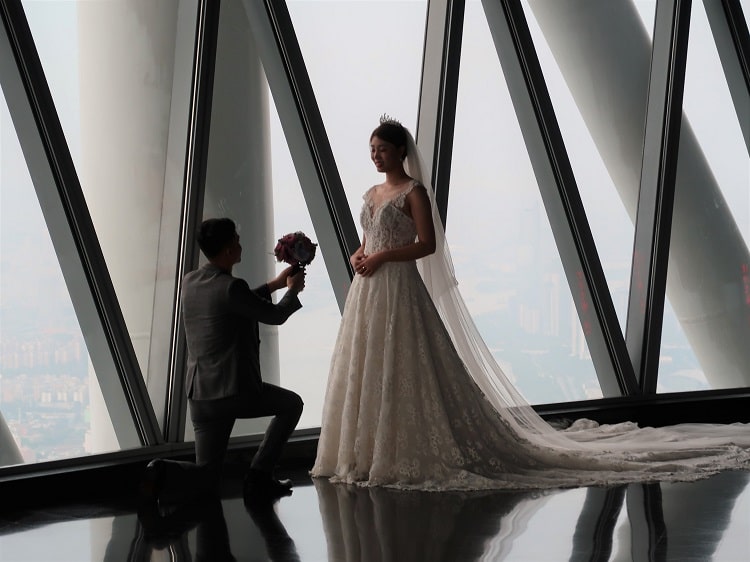
People are under pressure to get married in China. Image supplied by Mike Cairnduff.
The pressure to get married in China is enormous.
Women are expected to tie the knot by their late 20s, otherwise they’re referred to as ‘sheng nu’. This means ‘leftovers’.
And, once you’re married, the pressure to then have children also starts to mount.
Marriage Parks (or Dating Parks) can be found all over China. Hordes of desperate parents show pictures of their children, as well as personal information like age, height and education level, in an effort to partner them up before it’s too late.
Some traditional Chinese women will expect any potential suitor to pay her family a dowry, or bride price, prior to marriage. In exchange for paying a dowry, the girl’s family is generally expected to buy a car or to furnish the apartment.
For those who are getting married, professional wedding photography is essential. Many couples spend thousands of dollars to pose in front of artificial sets and capture their fantasies.
This takes place up to six months before the wedding.
Read more about Chinese women.
M is for Mao

Mao’s memory still permeates China. Image by Andrey Pozharskiy on Shutterstock.
Mao Zedong is probably the most famous Chinese person in recent history. Born in Hunan, a province in southern China, he led his country’s communist revolution.
The sweeping reforms he’s best known for are the Great Leap Forward (1958–60) and the Cultural Revolution (1966–76).
These often had disastrous consequences for China’s people and economy. Millions of people starved to death during this time.
However, Mao is seen as the most revered leader of China, at least in recent times.
If you travel to Beijing, you can take a photo of his portrait at the Gate of Heavenly Peace in Tiananmen Square. You can even get up close and personal with his preserved body at the Mausoleum of Mao Zedong.
Read more about famous Chinese people.
M is for Medicine

Acupuncture is a traditional Chinese treatment. Image supplied by Mike Cairnduff.
Traditional Chinese medicine aims to prevent or heal disease by maintaining or restoring balance between yin (passive) and yang (active).
A person is regarded as healthy when harmony exists between yin and yang. Illness, on the other hand, results from a breakdown in the equilibrium of these two forces.
Chinese massage, acupuncture and herbal remedies date back more than 2,000 years, and are still widely used today. They’re often used in a complementary way to modern medicine.
Read more about Chinese medicine.
M is for Money
Chinese are obsessed in money.
When I was working in China, strangers would blatantly ask me “How much money do you make?” I kind of liked it, seeing as it’s such a taboo question where I’m from.
It’s almost certainly a question a Chinese parent would ask their child when they started seeing someone.
And, you’ve probably seen or heard about Chinese tourists lining up at luxury stores overseas as well as in Hong Kong.
Money is a pervasive part of Chinese culture, even if it is a stereotype.
I find it all quite strange and unique, given China is meant to be a socialist country! But China did invent money after all, so…
For a funny perspective on China’s love of money, check out the video above. As Ronny Chieng says, “Chinese people love money so much, we have a God of money!”
Read more about why Chinese people love money.
O is for Opera

Opera is still prevalent in today’s Chinese culture. Image by Russell Yan from Pixabay.
Chinese opera is a traditional Chinese performing art.
If you’re traveling to China, it’s one of those traditional Chinese things you just have to see and experience for yourself. The unique shrieks and sounds of the singers will stay with you forever!
Beijing is home to the famous Peking Opera, and the Chengdu Opera has some pretty cool face-changing performances too.
Read more about Chinese operas.
P is for Pandas

Pandas are the ultimate symbol of China. Image supplied by Mike Cairnduff.
The giant panda is China’s national animal. And it’s a global symbol of cuteness.
It’s no wonder then that the government has done everything possible to preserve the species and prevent the panda from becoming extinct.
In a sign of hope for the species, China has recently reclassified the panda’s status from endangered to vulnerable. But there are still only about 1,800 pandas in the wild, living in fragmented mountainous forests near Chengdu.
Chinese people are really proud of their national symbol and have been loaning pandas to leading zoos around the world. This has helped raise awareness of this beautiful creature as well as China’s place in the world.
Read more about things you can do in Chengdu.
P is for Pedestrian crossings

Find a crossing to cross the road! Image supplied by Mike Cairnduff.
Pedestrian crossings in China are notoriously difficult to navigate safely.
Some drivers don’t stop. So, you have to look, and look again, and keep looking until you get to the other side!
Traffic light crossings tend to have a slightly better strike-rate when it comes to cars actually stopping, but even a green pedestrian light doesn’t guarantee right of way.
So, how do you cross a Chinese road and survive? Some locals will just step out and not look at all, hoping that the driver stops.
The best advice is to seek safety in numbers. Cross in a group whenever you can, but if you’re on your own, try to cross only at intersections with lights, or via overpasses (like in the photo above).
Read more about safety in China.
Q is for Queue jumping

A typical scene at a Chinese train station. Image by C.Hug on Flickr.
Unless you’re inside the international terminal of a major Chinese airport, the concept of lining up doesn’t exist in China.
Whether you’re at the supermarket, cinema or train station, it’s a classic case of every man and woman for themselves.
It’s practically in the DNA of the Chinese to find any way possible to jump the queue. It’s almost a sport! But the longer you stay in China, the more you get used to it.
Try not to get too annoyed – it’s part of the Chinese culture, after all. Just stand your ground and don’t leave a gap between you and the person in front of you.
Read more about why the Chinese won’t line up.
Q is for Qin Shi Huang

Emperor Qin Shi Huang’s Terracotta Army in Xi’an. Image by Christel Sagnieze on Pixabay.
Qin Shi Huang reigned from 221 BC to 210 BC. He was the founder of the Qin dynasty and the first emperor of a unified China.
However, Emperor Qin was known as a cruel leader. He outlawed most forms of religion and even ordered the burning of books.
But he’s not really famous for that. People know Qin Shi Huang for his elaborate tomb in Xi’an, western China, built to protect him in the afterlife.
This is known as the Terracotta Army. It’s said that about 700,000 people helped construct the 8,000 soldiers, horses and chariots made of terracotta.
The famous archaeological site was only discovered in 1974. And, in 2020, another 200 sculptures were miraculously found nearby.
Read more about the best places to visit in China.
R is for Religion
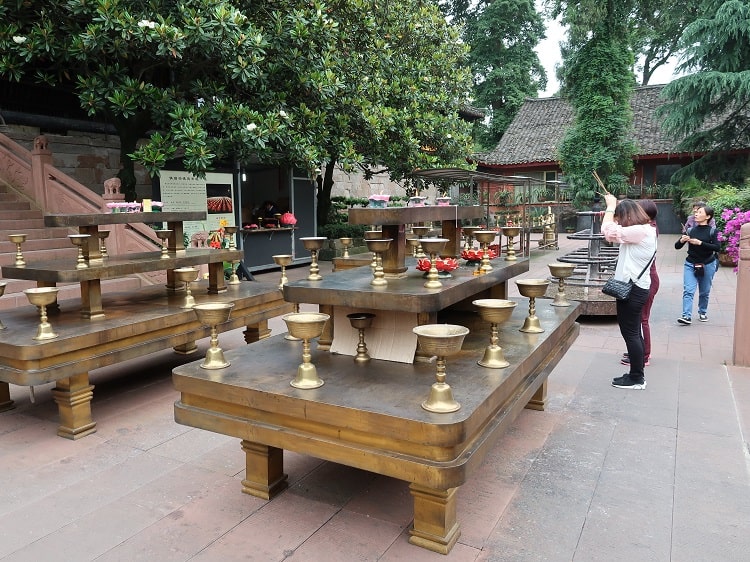
Chinese women praying to their God. Image supplied by Mike Cairnduff.
Some people assume that religion is against the law in China, but this isn’t the case.
While the Chinese Communist Party (CCP) is officially atheist, it recognizes five religions: Buddhism, Taoism, Islam, Catholicism and Protestantism.
Many Chinese people are spiritual and practice elements of Confucianism and other traditional folk religions in their day-to-day life. Temples can be found all throughout the country.
Chinese people practice religion rather discreetly. Religious activities are restricted and religious institutions aren’t seen actively recruiting new members as this could pose a threat to CCP ideology.
Similarly, large public congregations, like you might see in the US, are kept behind closed doors in China.
Read more about religion in China.
R is for Rice

The classic dish, fried rice. Image by Juno Kwon on Pixabay.
Steamed rice is one of the staple foods in China. It’s always eaten with something else.
Fried rice, on the other hand, is a dish that can be eaten all on its own. And it can feed the whole family too, which is one reason why it’s popular in China.
While ingredients do vary across the country depending on availability and local preferences, you can be sure to find some sort of protein in it, like pork or chicken, along with diced vegetables.
Some people think the best fried rice in all of China is found in a city called Yangzhou, in eastern Jiangsu province, hence the variety called ‘Yangzhou fried rice’.
Read more about popular foods from China.
S is for Smoking

Not an uncommon sight in China! Image by La Priz on Flickr.
China is the largest producer and consumer of tobacco in the world.
It’s estimated that there are more than 300 million smokers in China, nearly one-third of the world’s total. More than half of adult Chinese men are smokers.
Many Chinese people have little awareness of all the dangers of tobacco, despite efforts to educate the public. While people may know that smoking can lead to lung cancer, few know about the other risks like heart attack and stroke.
You can smoke indoors in China, like in restaurants and bars. For non-smokers, this custom is hard to get used to.
Read more about tobacco in China.
S is for Spitting
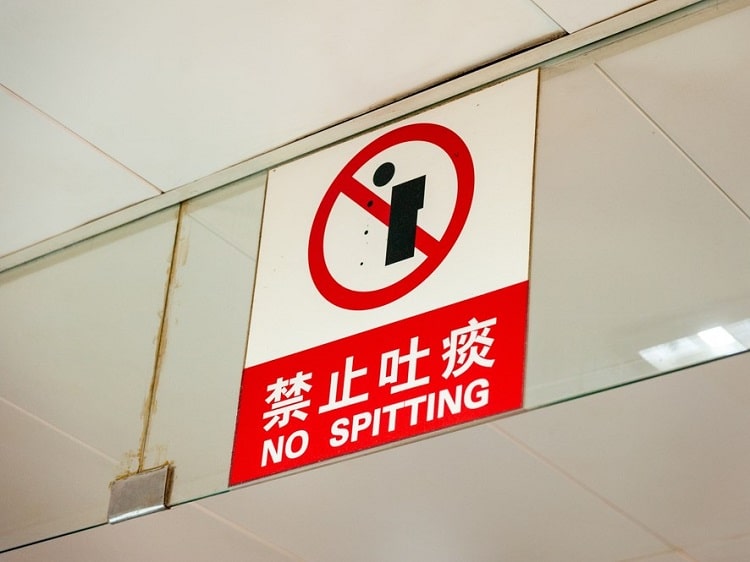
Locals have to be reminded not to spit. Image by Alex Segre on Shutterstock.
You might see and hear older men spit in China, even in the big cities. What gets most foreigners is the way these guys clear their throat – it’s very loud and there is nothing discreet about it.
Some men will spit in trash cans, while others will spit on the ground right in front of you.
As a foreigner, you’ll find this custom unsavory. But remember, every culture has its own idea of ‘normal’.
For example, blowing your nose into a handkerchief and stuffing it back into your pocket is considered disgusting by many in Chinese society.
So, why do some Chinese spit? It’s a tough question to answer. Some say it’s health related, i.e. it’s a way of removing waste from the body, and has been passed down by generations.
Read more about why Chinese spit.
S is for Squat toilets

Do you know how to survive a squat toilet? Image supplied by Gayle Aggiss.
If you’re planning a trip to China, you need to prepare yourself for squat toilets.
Even in the major cities like Beijing, you’ll find more squat toilets than traditional Western ones.
But if you find yourself in a small city, or even a large one that doesn’t see many tourists, you’re going to encounter squat toilets wherever you go.
And, despite recent efforts to clean them up, you’re bound to come across some really dirty ones. These are usually the public toilets, especially in rural areas.
Don’t worry though – your hotel room will have a Western-style throne. Just make sure you do your business before you go out touring for the day!
Read more about Chinese toilets.
T is for Table tennis
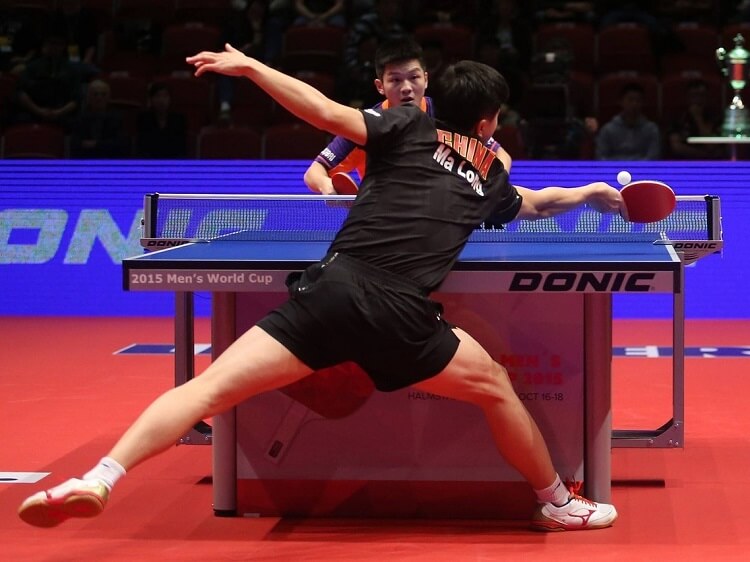
This sport is massive in China. Image by Djimenezhdez on Pixabay.
This is the most prominent sport in China.
In the early 1950s, Chinese leader Mao Zedong declared table tennis a national sport. Its popularity spread throughout the country, making Chinese athletes the strongest in the world within a short period of time.
The sport is just as popular now as it was decades ago. There are ping pong tables in every school, so kids get to learn from a very young age.
When I was teaching English in China, I remember being amazed at how good the little kids were! I guess that’s what happens when you grow up surrounded by ping pong tables.
Table tennis is an inclusive sport which is important for a socialist country like China. No matter your age, gender, wealth or even your level of fitness, table tennis is for the masses.
The game also doesn’t require a lot of space, which is ideal in a crowded country like China.
Read more about sports in China.
T is for Tea

Tea is the national drink. Image by Gadost0 on Pixabay.
Chinese are obsessed in tea. It’s undisputedly the national drink.
There are numerous tea growing regions in China, meaning there are lots of tasty teas to try such as oolong, chrysanthemum and tieguanyin.
However, green tea is the most common. It’s found on restaurant tables across the country.
I remember a trip I took to Shenzhen once, where I bought a few tins of lychee tea as souvenirs for friends back home.
This flavor may sound a bit strange, but it’s actually quite subtle and makes for a beautiful tasting hot drink.
When you’re drinking tea with people in China, they will always refill your cup before you finish. It’s a way of honoring people and if you refill someone else’s cup, you’re showing them a great deal of respect.
Read more about Chinese souvenirs.
T is for Technology

Chinese tech is changing people’s lives. Image by Jared Brashier on Unsplash.
China loves technology, and is leaps and bounds ahead of many other countries.
The country is innovating in many areas such as high-tech manufacturing, energy storage, artificial intelligence and quantum computing.
Homegrown Chinese phone brands like Xiaomi and OPPO are taking the world by storm. In fact, Xiaomi is now the third most popular phone brand in the world, behind Samsung and Apple.
China is also moving to a cashless society, helped by payment apps like WeChat Pay and Alipay.
And, Chinese drones are really taking off (pardon the pun) and there are special designated areas where these flying robots are delivering products to customers.
Read more about Chinese drones.
W is for Weird food

There’s plenty of weird food in China. Image supplied by Mike Cairnduff.
There’s plenty of weird and wonderful food in China. Much of it is very different to the food you’re used to.
From crunchy chicken feet and stinky tofu to deep fried durian for dessert, your tastebuds and senses will be pushed to the limit if you get the chance to visit China.
Read more about weird food Chinese people eat.
X is for Xi Jinping

Chinese leader Xi Jinping. Image by Kaliva on Shutterstock.
Party ruler Xi Jinping is prominent in modern day Chinese culture. He’s one of the most famous Chinese people and one of the most powerful people in the world.
Although Xi Jinping has been involved in politics most of his life, as a teenager he worked as a manual laborer on an agricultural commune.
In 2017, he released a set of policies and ideas called ‘Xi Jinping Thought on Socialism with Chinese Characteristics for a New Era’. Private organisations, schools and other organisations are expected to follow this doctrine.
Love him or loathe him, he’ll be around for a while. In 2018, the National People’s Congress passed an amendment to the constitution which would abolish term limits for presidents.
This means Xi Jinping can remain in office beyond 2023.
Read more about famous Chinese people.
Z is for Zodiac

The dragon is the most powerful sign in the Chinese zodiac. Image supplied by Mike Cairnduff.
The Chinese zodiac has a special place in the hearts of Chinese people.
Each year is identified by 1 of 12 different zodiac animals: rat, ox, tiger, rabbit, dragon, snake, horse, goat, monkey, rooster, dog, and pig. Each animal carries qualities that influence the year and any children who are born in that year.
Most Chinese people take their zodiac animal and year of birth seriously, and this is usually a key part of the country’s New Year celebrations.
In Chinese culture and traditions, the dragon is regarded as the most powerful sign in the zodiac. As well as power, dragons symbolize luck, prosperity, strength and success.
The dragon is also the only imaginary animal in the zodiac – another reason why it’s such a revered sign.
Read more about zodiac animals.
Psst! A quick travel tip
Are you traveling to China soon? If so, don’t forget the internet is censored there.
When using Wi-Fi you won’t have access to your favorite sites like Facebook, Instagram, WhatsApp, Gmail, Google, and heaps more, unless you get a VPN before you go.
You can refer to my review for the best China VPN or skip the review and tap on the button below.
Just make sure you download it before you arrive as the website will be blocked in China.
Chinese culture all wrapped up
If you’ve gotten this far, congratulations! You’re now a Chinese culture guru.
In all seriousness though, I hope you’ve learned a little bit more about this fascinating culture. It will help you understand China more, which is particularly handy if you’re planning a trip there.
As always, drop me a line below if you have any questions or comments.
More Chinese culture gems
Are you hooked on Chinese culture? Then you might like the following articles:
- Best movies about Chinese culture – watch new and old classics
- Best Chinese history books – arm yourself with knowledge
- Chinese cultural norms – learn about some unique quirks.
You can also delve into the best documentaries about China and then watch one!
Frequently asked questions about Chinese culture
What is Chinese culture?
It’s a combination of a number of things, such as customs, traditions, habits, etc, that help shape China and typify what the country is all about. There’s not one single thing that represents Chinese culture.
When did Chinese culture start?
It started thousands of years ago when people civilized China. Early records show the Shang Dynasty started as early as 1600 B.C. but the Xia Dynasty, from 2100 B.C., could predate that.
Why is Chinese culture important?
It influences over one billion Chinese people as well as people around the world. It helps explain why Chinese people do certain ways, like certain things, say certain things and even eat certain things.
How is Chinese culture different from American culture?
China is a collectivist country while the USA is individualistic. The countries have very different histories which have influenced how their cultures have developed.



